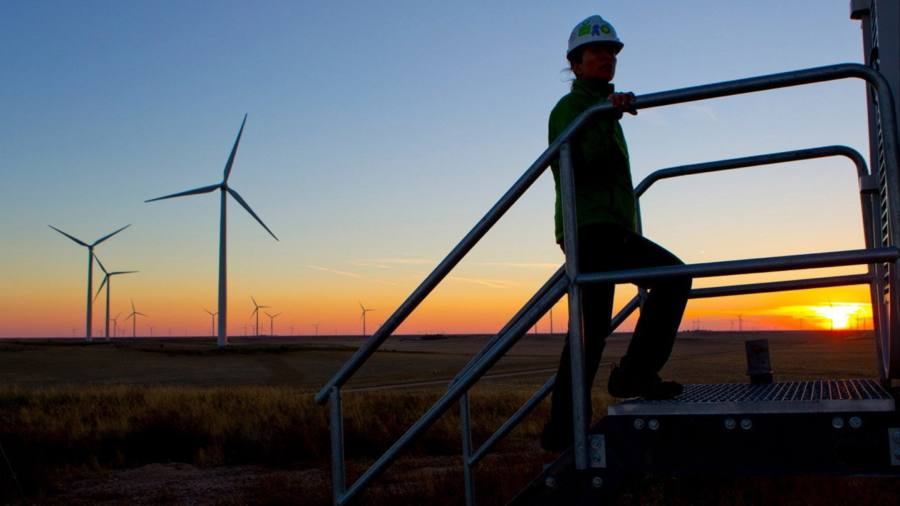Receive free Energy sector updates
We’ll send you a myFT Daily Digest email rounding up the latest Energy sector news every morning.
Republican-controlled areas of the US are dominating a rush of clean technology project investment as President Joe Biden goads opponents for “claiming credit” for the jobs boom despite their efforts to block his landmark climate legislation last year.
More than 80 per cent of investment in large-scale clean energy and semiconductor manufacturing pledged since last year’s passage of the Inflation Reduction Act and the Chips and Science Act is destined for Republican congressional districts, a Financial Times analysis found.
The president has made the green investment boom and job creation a focus of his 2024 re-election bid, while emphasising Republican opposition to the legislation that has sparked the spending spree. While the Chips Act received some Republican support in Congress, no members of the party voted in favour of the IRA.
“That hasn’t stopped them from claiming credit for the billions of dollars and thousands of jobs that are coming to their states,” Biden told a crowd at a new wind tower factory in New Mexico on Wednesday. “We’ll see them at the groundbreaking.”
The FT tracked more than 110 projects worth at least $100mn announced since the two pieces of legislation were passed last August, promising to create 100,000 jobs. Republican-governed states such as Georgia, South Carolina and Ohio are among the top for company commitments.
The IRA and the Chips Act together include more than $400bn in tax credits, grants and loans designed to reindustrialise the US heartlands and decarbonise the world’s largest economy.
“This is the biggest transition you will see in your lifetime,” said Andrés Gluski, chief executive of AES, one of the world’s largest utility developers. “Some of the politicians may have spoken out against it, but they’re going to be big winners.”
The president has been keen to point out instances of red districts benefiting from clean investment despite their lawmakers’ opposition to his climate agenda.
On Wednesday, he cited a new project from CS Wind, a South Korean manufacturer, which in April broke ground to expand its wind tower plant in Pueblo, Colorado, already the largest in the world. Biden pointed out the plant is in the congressional district of GOP firebrand Lauren Boebert, “that very quiet, Republican lady”.
“She railed against its passage,” he said on Wednesday. “But that’s OK — she’s welcoming it now.”
Biden made similar jabs at Republican congresswoman Marjorie Taylor Greene and senator Lindsey Graham during a tour of a new solar inverter facility in South Carolina last month. Both lawmakers represent constituencies at the front lines of the cleantech manufacturing boom, with Greene’s district home to the largest solar supply chain investment since the IRA’s passage.
Republicans’ success in attracting investment is partly due to their districts often having large swaths of available land and cheap labour, but states such as Georgia and Ohio have also rolled out their own hefty tax breaks and subsidies to attract developers, including through roadshows in Europe and Asia.
“These companies, irrespective of what state they choose, can get those federal benefits. So they then come to us and say, ‘What can you do for us at a state level?’” said Andrew Deye, vice-president of strategy at JobsOhio, the state’s economic development arm.
Ohio has attracted a number of cleantech projects this past year, including a $4.4bn battery plant from Honda and LG Energy Solution that received more than $300mn in incentives from JobsOhio and the state government.
Investor interest in GOP-controlled districts presents a growing conundrum for Republican lawmakers as they attack federal spending for clean energy, even while legislatures and governors in red states continue to compete for IRA-related investment.
“The Democrats’ Inflation Reduction Act put Americans on the hook for handouts to big corporations and big banks,” said Republican congressman Jason Smith, chair of the House Ways and Means Committee in June after it passed a bill that would roll back the IRA. “We are doing away with the very worst of Democrats’ special interest handouts for the wealthy.”
But the domination of Republican districts in securing investment also underscores the uphill battle Biden faces as he tries to take credit for jobs and projects amid consistently low approval ratings.
He was in New Mexico as part of a nationwide tour of manufacturing sites to tout “Bidenomics”, his economic strategy which promotes government funding to stimulate private sector investment and build a domestic supply chain.
But the message has struggled to convince voters, with the president’s approval ratings languishing amid persistently high inflation. A Washington Post and University of Maryland survey in July found that more than half of US voters disapprove of his actions on climate and are unaware of the IRA clean energy tax credits.
“The competition will be who can take credit for the increase in new investment and new jobs,” said Sasha Mackler, head of the energy programme at the Bipartisan Policy Center. “The Inflation Reduction Act is the single largest investment and federal action on climate probably in the nation’s history . . . [Biden] has a lot to run on and he really needs to figure out a way to clarify that message.”
Aside from manufacturing, Republican states are also leaders in clean energy deployment, with Texas, Oklahoma and Florida among the top states for installations last year, according to the American Clean Power Association, a clean energy industry lobbying group.
“I keep my fingers crossed that [the IRA] won’t be repealed,” said Håkon Volldal, chief executive of Nel Hydrogen, a Norwegian company that announced a $400mn manufacturing investment in Michigan in May.
“The whole purpose of building that plant in Michigan is because we believe that North America will be a very important market . . . If that’s not the case, then we need to look elsewhere.”
Read the full article here




